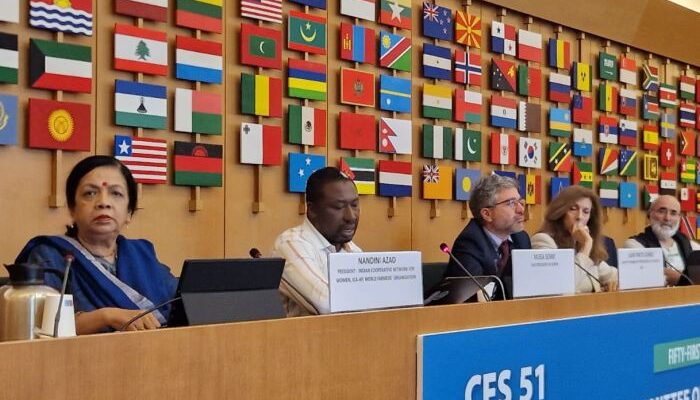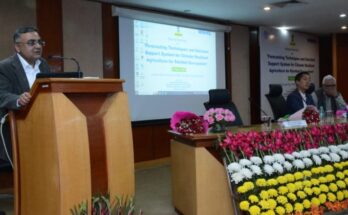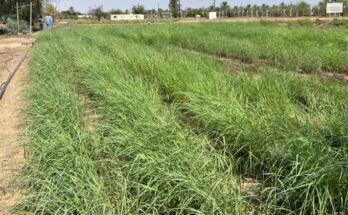In her presentation at the 51st Session of the Food and Agriculture Organization’s (FAO) Committee on Food Security (CFS) in Rome on October 23-27, Dr. Nandini Azad, President of the Indian Cooperative Network for Women (ICNW) and Global Coordinator-Cooperative at the World Farmers Organization (WFO) highlighted the critical need to make family farming a cornerstone of national agricultural policies in the face of climate change challenges. Her message was clear: family farming, women empowerment, and youth involvement are essential tools to advance the goals of the UN Decade of Family Farming 2019-2028 (UNDFF).
Dr. Azad, who was the only woman in the Panel discussion on a highly serious issue, emphasised that promoting a farmer-driven approach to policymaking and implementation is essential at all levels. The global priority of establishing sustainable and resilient food systems places farmers, especially women farmers, at the forefront of climate-friendly, gender-resilient strategies. They play a crucial role in providing nutritious and affordable food while preserving biodiversity and ecosystems.
For the agriculture sector to achieve its objective of sustainable and resilient food systems, it requires significant investments and the integration of farm produce into global markets. Farmers’ organisations and cooperatives are key stakeholders in empowering farmers as agents of change. These organisations promote organised farming and create market linkages, contributing to sustainable agriculture.
You may also like to read: BharatRohan, ICRISAT collaborate to empower farmers with drone technology and sustainable solutions
Dr. Azad highlighted the importance of gathering women farmers and other relevant stakeholders to discuss the role of farmers and their organisations in the journey toward sustainable food systems. At the same time, she stressed the need to raise awareness about the substantial contributions of family farmers, especially women, at the community level and the barriers they face in accessing resources, finance, and education.
Her recommendations for improvement included engaging governments to invest in organised agriculture and family farming, with a particular focus on women and youth. Strengthening the link between global and local levels and promoting cooperation among relevant stakeholders were also key suggestions. Dr. Azad emphasised the need to avoid working in isolation and encouraged the creation of synergies with other global processes to ensure consistency in approaches and projects.
During the sessions, the Working Women’s Forum (India) – ICNW highlighted its initiatives in providing continuous financial assistance to women members during the pandemic, which not only helped them survive difficult times but also paved the way for a more prosperous future. ICNW remains committed to empowering underprivileged women and working towards a brighter and sustainable future for all.
You may also like to read: Zuari FarmHub, CropX Technologies collaborate for advancing tech-enabled farming solutions in India
The panellists at the CFS session on “Scaling up the implementation of CFS policy instruments in times of climate crisis: The role of the UN Decade of Family Farming 2019-2028 (UNDFF)” stressed the significance of family farming as a way of life. Family farmers, who make up 30 per cent of the world’s population, produce over 80 per cent of the world’s food in value terms. They play a pivotal role in ensuring food and nutritional sovereignty and security while acting as custodians of biodiversity, landscapes, and cultural heritage.
Family farmers, often small-scale producers, are the first to experience the effects of climate change, but they also rapidly adapt and innovate to mitigate its impact. Their unique potential lies in driving the transformation towards more sustainable, resilient, biodiverse, and nutrition-sensitive agriculture and food systems. This transformation can provide economic and social benefits while safeguarding the ecosystems on which agriculture relies and respecting the cultural and social diversity of territories.
The importance of providing family farmers with access to adequate policies and instruments cannot be overstated. It is a fundamental element in addressing current and future interconnected challenges, including climate change, to ensure sustainable agrifood systems.
You may also like to read: Emerging technologies and precision farming SaaS to design future landscape for agriculture
Family farming is a central focus of the CFS programme, deeply intertwined with their products and policy recommendations. The UNDFF has successfully driven policy change in more than 76 countries, involving a multitude of actors, including family farmers’ organisations and federations. Since its launch, the Decade has led to the development and approval of 260 policies, laws, and regulations that support family farming and the transformation towards sustainable agrifood systems.
Dr. Nandini Azad’s presentation at the FAO’s CFS 51 in Rome highlighted the importance of family farming, women’s empowerment, and youth involvement in achieving sustainable and resilient food systems. Her recommendations for engaging governments, strengthening cooperation, and avoiding silos are essential steps toward realising these goals. Family farming, with its crucial role in global food production, must remain at the forefront of policy and action to address climate change and ensure a sustainable agrifood future.
Scaling up the implementation of CFS policy instruments in time of climate crisis: The role of the UN Decade of Family Farming 2019-2028 (UNDFF) drew serious attention during the 51st Meet. In Chair during the session Marcela Villarreal, Director, Partnerships and UN Collaboration Division, FAO called Dr Azad’s presentation compelling and actionable. The European Commission Representative to FAO in Rome Renate Hahlen, in her closing remarks, also quoted Dr. Azad’s points on deconstructing patriarchal structures and roles of women farmers. In his opening remarks during this session Mario Arvelo, Ambassador, Permanent Representative of the Dominican Republic to the Rome-based agencies of the United Nations and Member of the UNDFF International Steering Committee also echoed the call of Dr Nandini Azad for gender parity.





